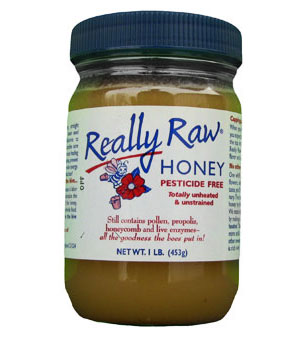Thanks, Haai, you understood me correctly. Yes, CitrusHigh, I am familiar with what mead is, thanks. I can understand not seeing clearly the difference between mead and raw fermented honey because I was surprised myself when I learned that there's a significant difference. I've often consumed both mead and raw fermented honey and I can assure you that the difference is quite noticeable. Like Haai said, mead is a liquid beverage, whereas raw fermented honey is a thick, sticky product that looks like honey. I hope the following clarifies it further:
"Since early times, man has made fermented drinks with honey. The most important was mead, an alcoholic beverage, enjoyed by the English and Russians. The word derives from the Sanskrit word for honey, which is madhu. A similar drink called t’ej is popular in Ethiopia.
What is less well known is the fact that honey itself can ferment, if it contains enough residual moisture [please note that it's not equal parts water or anywhere near that] and is left in a warm place–honey ferments but never spoils! Fermented honey actually expands somewhat, and develops rich flavors. It is an even better aid to digestion than regular honey.
The recipes in the sidebar all call for raw, unfiltered honey, preferably fermented, and all involve lactic-acid fermentation to which the honey contributes. In all of them, the enzymes are preserved, as none require high temperatures to prepare." --Sally Fallon, http://planetthrive.com/2007/08/benefits-of-raw-fermented-honey/
So the biggest difference is that mead requires a lot more water, which produces a product that is much more alcoholic. Mead looks like wine, a liquid beverage and often semi-clear, whereas raw fermented honey does not look much different from standard raw honey. Here's an image of the standard Really Raw brand honey, and I can't see any difference between the appearance of that vs. the fermented honey I buy from them, based on this image:

, though I'll bet there is some difference that I could see if I held both products up closely together and examined them.
Here's an image of the mead I've had:

Also, from what I've read, commercial mead usually employs added brewer's yeast, rather than relying on the natural yeast in the honey. Sometimes grain mash, spices, fruit, or hops is added to mead.
Sally Fallon provides some hints on how to make your own fermented honey, but she doesn't give much in the way of details. I'm guessing that one just adds a drop or two of water, keeps the jar open a crack and keeps it in a mildly warm place. I'm interested in hearing from anyone who has made their own raw fermented honey (not mead).
Please no one post about mead again in this thread. I know it's well intentioned, but I would prefer if possible that this thread stay on the subject of raw fermented honey containing no more than trace amounts of alcohol, even after being stored for lengthy time periods. On the Internet there is already much confusing of raw fermented honey with mead and I was hoping to avoid that. Thanks.
Oh for sure. Yeah you would just add only a little bit of water, but it's still going to ferment in to alcohol like you said.
The Really Raw brand of fermented honey does not taste alcoholic, nor does it noticeably have any of the effects of alcohol, and their spokesperson assured me that there is at most only trace amounts of alcohol in it.
RFH is more of a fermented food like sauerkraut than a fermented beverage. Sauerkraut is raw fermented cabbage which also contains a trace amount of alcohol (about 0.25% ethyl alcohol" according to the Handbook of indigenous fermented foods By Keith H. Steinkraus). No one would mistake sauerkraut for an alcoholic beverage (at least I hope not

).
I guess the amount of moisture you add would set the limit for how much fermentation could take place. If you add too little water, if I remember correctly very little will happen. I think I tried that back when I first tried to ferment and nothing came of it so I went to the other extreme and mixed 1 part water with 1 part honey. You will have to experiment to get your desired effect.
Yes, it probably does require some experimentation and I was hoping that someone might have had success with making their own fermented honey like the Really Raw brand, which is thick and creamy rather than watery and has no alcoholic taste or effect, rather than your 50-50 semi-mead mix.
If I ever learn how to do it, I'll share what I learn here. If I'm successful I'll have the option of buying local honey and fermenting it myself instead of relying completely on expensive product shipped across country.
